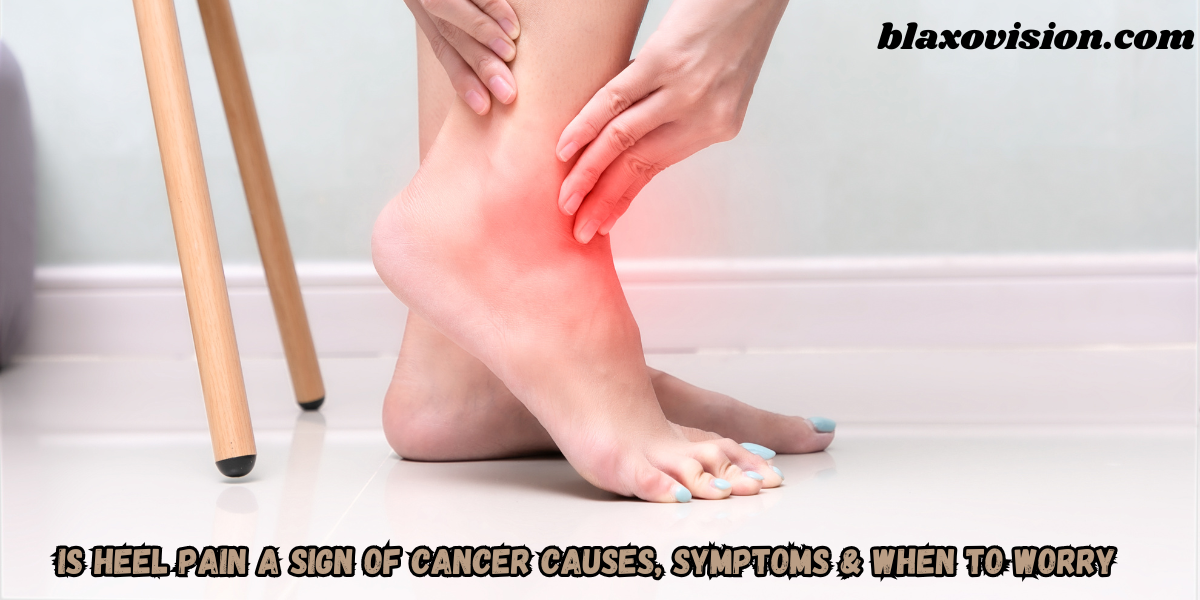Heel pain is a common issue that affects millions of people worldwide. While most cases result from conditions like plantar fasciitis, Achilles tendonitis, or arthritis, some people worry that persistent heel pain might indicate something more serious—like cancer. But is heel pain a sign of cancer In this article, we’ll explore the possible causes, risk factors, and warning signs of heel pain and whether it can be linked to cancer.
Understanding Heel Pain and Its Causes
Heel pain can stem from various issues, ranging from overuse injuries to serious medical conditions. Some of the most common causes include:
Common Causes of Heel Pain
| Condition | Description |
|---|---|
| Plantar Fasciitis | Inflammation of the plantar fascia, causing sharp pain, especially in the morning. |
| Achilles Tendonitis | Inflammation of the Achilles tendon due to overuse. |
| Heel Spurs | Bony growths on the underside of the heel bone. |
| Bursitis | Inflammation of the bursa, leading to heel tenderness. |
| Stress Fractures | Small cracks in the heel bone from repetitive stress. |
| Arthritis | Osteoarthritis or rheumatoid arthritis affecting the heel joint. |
However, in rare cases, persistent or unexplained heel pain may be associated with more serious conditions, including cancer.
Read Also: Can You Go to Jail at an Arraignment Everything You Need to Know
When Heel Pain Might Indicate Cancer
Most cases of heel pain are benign, but in rare instances, it could be a sign of something more serious, like bone cancer. Some types of cancer that might cause heel pain include:
Types of Cancer Linked to Heel Pain
- Bone Cancer (Osteosarcoma) – A rare but aggressive cancer that affects bones, including the heel.
- Ewing’s Sarcoma – A type of bone cancer that occurs in children and young adults.
- Metastatic Cancer – Cancers that spread from other parts of the body (e.g., lung, breast, or prostate cancer) can sometimes cause heel pain if they metastasize to the bones.
Warning Signs of Cancer-Related Heel Pain
If heel pain is due to cancer, it is often accompanied by additional symptoms, such as:
- Persistent pain that does not improve with rest
- Swelling or lumps near the heel
- Unexplained weight loss
- Night pain that worsens over time
- Fractures occurring with minimal impact
If you experience these symptoms, consult a healthcare provider for further evaluation.
Read Also: Harmonicode com: A Comprehensive Guide
When to Seek Medical Advice
While most heel pain cases are non-cancerous, it’s essential to know when to see a doctor. Here are some guidelines:
When to See a Doctor
- If the pain lasts more than two weeks despite home treatments
- If you notice a lump, swelling, or discoloration around the heel
- If the pain worsens at night or while resting
- If you have a history of cancer and develop persistent heel pain
- If you experience sudden weight loss or fatigue along with heel pain
Diagnostic Tests for Cancer-Related Heel Pain
Doctors may use the following tests to diagnose the cause of heel pain:
- X-rays – To check for bone abnormalities
- MRI or CT Scan – To detect tumors or soft tissue changes
- Biopsy – If a suspicious growth is found
- Blood Tests – To check for cancer markers
Read Also: The Impact of AI in 24M SeptemberMurphyBloomberg
Home Remedies & Treatments for Heel Pain
If your heel pain is not cancer-related, several home remedies can help:
Home Remedies
- Rest & Ice Therapy – Reduces inflammation and pain
- Stretching Exercises – Helps relieve tension in the heel and arch
- Supportive Footwear – Provides proper arch support
- Orthotic Insoles – Alleviates pressure on the heel
- Pain Relievers – NSAIDs like ibuprofen can reduce pain and swelling
Medical Treatments
| Treatment | Purpose |
| Physical Therapy | Strengthens foot muscles and improves flexibility. |
| Steroid Injections | Reduces inflammation in severe cases. |
| Shockwave Therapy | Stimulates healing in chronic pain cases. |
| Surgery | Considered only for persistent, severe cases. |
Read Also: Letflix The Ultimate Guide to Streaming Simplified
FAQs About Is Heel Pain a Sign of Cancer
1. Is heel pain a common symptom of cancer?
No, heel pain is rarely a symptom of cancer. It is more commonly associated with conditions like plantar fasciitis or Achilles tendonitis.
2. What are the early signs of bone cancer in the heel?
Early signs may include persistent pain, swelling, night pain, and unexplained weight loss.
3. Can a heel spur turn into cancer?
No, heel spurs are benign bone growths and do not develop into cancer.
4. How do doctors determine if heel pain is cancer-related?
Doctors use imaging tests like X-rays, MRIs, and sometimes biopsies to rule out cancer.
5. When should I be concerned about my heel pain?
If your pain lasts over two weeks, worsens at night, or is accompanied by swelling or weight loss, seek medical attention.
Conclusion
Heel pain is usually caused by common conditions like plantar fasciitis, Achilles tendonitis, or arthritis. However, in rare cases, persistent or unexplained heel pain could be linked to bone cancer or metastatic cancer. If your heel pain is severe, persistent, or accompanied by other concerning symptoms, consult a healthcare provider for proper diagnosis and treatment.
By understanding the possible causes and warning signs, you can take appropriate steps to address heel pain effectively and rule out serious conditions. Always prioritize your health and seek professional advice when in doubt.



